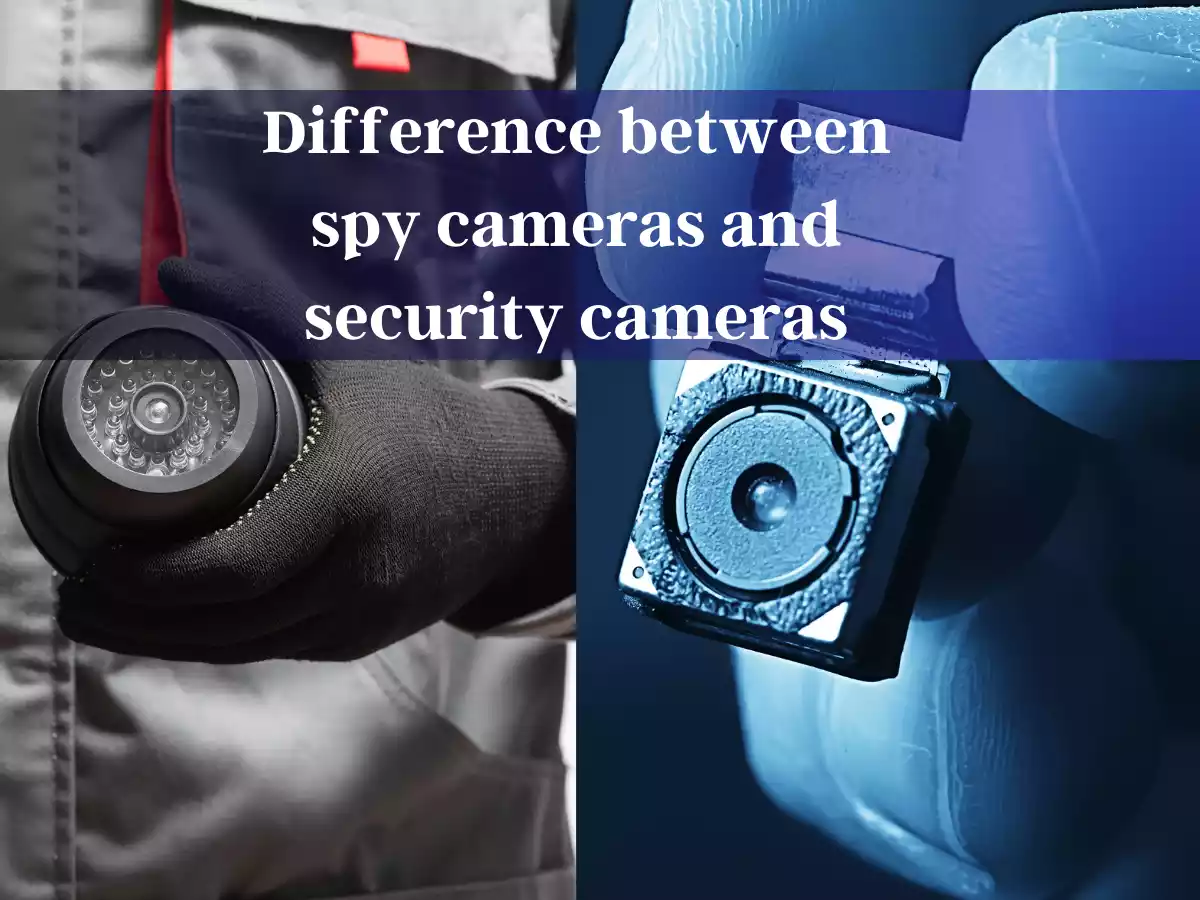Table of Contents
ToggleSpy cameras vs security cameras
Security cameras and spy cameras are both used to monitor and record events, but they serve different purposes and have distinct features. Spy cameras are often used for covert surveillance, while security cameras are typically used for public surveillance and crime prevention. In this blog post, we will explore the differences between spy cameras and security cameras, including their functionality, design, legality, and ethical considerations. By the end of this post, you will have a better understanding of the two types of cameras, and which one is the right fit for your specific needs.
Spy cameras
Spy cameras, also known as hidden cameras or secret cameras, are designed to capture video or audio footage discreetly. They are often used for private investigation or personal security purposes, such as monitoring nannies or caregivers, keeping an eye on employees, or recording suspicious activity.
Spy cameras are small and discreet, making them easy to hide in everyday objects such as pens, clocks, and even teddy bears.
How spy cameras work
Spy cameras are typically small and easy to hide, which makes them perfect for secret surveillance. They work by capturing video or audio footage and transmitting it to a storage device, such as an SD card or a remote server.
Most spy cameras are equipped with a built-in battery or can be powered by an external source such as a USB port or power outlet. Some models are motion-activated or can be controlled remotely through a mobile app, allowing for easy monitoring and recording.
The captured footage can be viewed later on a computer or mobile device, or in real-time if the camera is connected to a wireless network.
Overall, spy cameras are designed to be discreet, allowing for secret surveillance without drawing attention to themselves.
Types of spy cameras
There are several types of spy cameras available, each with its own set of features and capabilities.
Wired spy cameras
These cameras are connected to a power source and a recording device through wires. They are typically used for long-term surveillance and can be hidden behind walls or other structures.
Wireless spy cameras
These cameras use wireless technology to transmit footage to a recording device, such as a DVR or a mobile app. They are often more flexible than wired cameras and can be easily moved or repositioned as needed.
Body-worn spy cameras
These cameras are designed to be worn on the body, such as in a shirt button or a pair of glasses. They are often used for undercover work or personal security.
IP spy cameras
These cameras are connected to the internet and can be accessed remotely from a computer or mobile device. They often have advanced features such as motion detection and real-time notifications.
Nanny cameras
These cameras are designed to monitor nannies or caregivers, often hidden in common household objects such as clocks or toys.
Overall, the type of spy camera you choose will depend on your specific needs and the type of surveillance you want to conduct.
Examples of spy camera usage
Spy cameras can be used for a variety of purposes, both legal and illegal. Here are some examples of legitimate uses for spy cameras:
Nanny or caregiver monitoring
Spy cameras can be used to monitor caregivers or nannies who are taking care of children or elderly family members.
Home or business security
Spy cameras can be used to monitor entrances or high-risk areas in homes or businesses to deter or capture intruders or thefts.
Personal safety
Spy cameras can be used for personal safety by recording interactions with strangers, capturing incidents of harassment or assault, or as evidence in legal proceedings.
Law enforcement
Spy cameras can be used by law enforcement agencies to gather evidence during an investigation or for undercover operations.
However, it is important to note that using spy cameras for illegal activities, such as invading someone’s privacy or capturing footage without their consent, is against the law and can result in legal consequences.
Legality and ethical considerations
The use of spy cameras is subject to legal and ethical considerations. In general, using a spy camera to record someone without their knowledge or consent is illegal and considered a violation of privacy.
In some countries and states, it is illegal to use a spy camera in any situation without obtaining the prior consent of all parties involved. In other jurisdictions, it may be legal to use a spy camera in certain situations, such as for personal safety or law enforcement purposes.
It is important to understand the laws in your jurisdiction before using a spy camera. Additionally, it is important to consider the ethical implications of using a spy camera, even if it is legal. Recording someone without their knowledge or consent can be a violation of their privacy and can cause harm to their reputation or relationships.
Overall, it is important to use spy cameras responsibly and only for legitimate purposes, and to always respect the privacy of others.
Security cameras
Security cameras, also known as surveillance cameras, are designed to monitor public spaces and deter crime. They are often used in businesses, schools, public areas, and other places where large numbers of people gather.
Security cameras are used to provide continuous monitoring of a specific area, such as a parking lot, lobby, or storefront. They can be used to deter crime, capture evidence of criminal activity, and help law enforcement agencies investigate crimes.
How security cameras work
Security cameras are typically connected to a recording device, such as a DVR or NVR, which stores the footage captured by the cameras. The cameras can be set up to record continuously or to only record when motion is detected.
The footage can be viewed in real-time or accessed later for review. Many security cameras also have remote access capabilities, allowing users to view the footage from a computer or mobile device.
Types of security cameras
There are several types of security cameras available, each with its own set of features and capabilities.
Dome cameras: These cameras are often used in indoor settings and have a dome-shaped cover that makes it difficult to see where the camera is pointing.
Bullet cameras: These cameras are often used in outdoor settings and have a cylindrical shape. They are designed to be weather-resistant and have a long-range lens for capturing footage from a distance.
PTZ cameras: These cameras are designed to pan, tilt, and zoom to capture footage from different angles. They are often used in large areas such as parking lots or stadiums.
Thermal cameras: These cameras use heat detection technology to capture images in low-light or dark conditions.
Legality and ethical considerations
The use of security cameras is subject to legal and ethical considerations. In general, security cameras can be used in public places and businesses as long as they do not violate anyone’s privacy.
It is important to understand the laws in your jurisdiction before installing security cameras, as there may be restrictions on where cameras can be placed or what they can be used for. Additionally, it is important to consider the ethical implications of using security cameras, such as the potential for invasion of privacy or discrimination.
Overall, it is important to use security cameras responsibly and only for legitimate purposes, such as crime prevention or public safety.
Examples of security camera usage
Security cameras are used in a wide range of settings for various purposes. Here are some examples of legitimate uses for security cameras:
Business security
Security cameras can be used to monitor entrances, exits, and high-risk areas in businesses to deter theft, vandalism, and other criminal activities.
Public safety
Security cameras can be used in public spaces, such as parks or transportation hubs, to monitor for suspicious activity and respond to emergencies.
Law enforcement
Security cameras can be used by law enforcement agencies to investigate crimes, gather evidence, and identify suspects.
School safety
Security cameras can be used in schools to monitor entrances and exits, prevent bullying, and respond to emergencies.
Traffic monitoring
Security cameras can be used to monitor traffic flow, detect accidents, and identify drivers who violate traffic laws.
Home security
Security cameras can be used to monitor entrances, deter intruders, and provide evidence in the event of a break-in.
It is important to note that the use of security cameras should always be done in compliance with applicable laws and regulations, and with respect for the privacy rights of individuals.
Comparison between spy cameras and security cameras
While both spy cameras and security cameras are used for surveillance purposes, there are several key differences between the two.
Purpose
The primary purpose of security cameras is to provide surveillance and security in public places, businesses, and homes. They are used to deter criminal activity, monitor public safety, and provide evidence in the event of a crime.
Spy cameras, on the other hand, are designed to be secret and are often used for surveillance in private settings. They can be used for various purposes, including spying on a spouse or partner, monitoring children or employees, or gathering information for personal gain.
Legality
The use of spy cameras is subject to legal and ethical considerations. In general, using a spy camera to record someone without their knowledge or consent is illegal and considered a violation of privacy. In contrast, security cameras can be used in public places and businesses as long as they do not violate anyone’s privacy and comply with applicable laws and regulations.
Visibility
Security cameras are typically large and visible, while spy cameras are designed to be hidden and disguised as everyday objects, such as a pen or a clock. Security cameras are intended to be a visible deterrent to criminal activity, while spy cameras are intended to go unnoticed.
Features and capabilities
Security cameras typically have more advanced features and capabilities than spy cameras. For example, security cameras may have high-definition resolution, infrared night vision, motion detection, and remote access capabilities. Spy cameras, on the other hand, may have limited features and capabilities due to their small size and secret nature.
Cost
Security cameras can vary in cost depending on their features and capabilities, but generally, they are more expensive than spy cameras. Spy cameras are often relatively inexpensive and can be purchased online or in specialty stores.
Overall, while both spy cameras and security cameras are used for surveillance purposes, they serve different functions and have different legal and ethical considerations. It is important to carefully consider the purpose and use of these cameras and ensure compliance with applicable laws and regulations.
Conclusion
In conclusion, spy cameras and security cameras are both used for surveillance purposes, but they have distinct differences in terms of their purpose, legality, visibility, features, and cost. Security cameras are primarily used for providing surveillance and security in public places, businesses, and homes, while spy cameras are designed to be hidden and used for surveillance in private settings.
It is essential to use both types of cameras responsibly and in compliance with applicable laws and regulations. The use of spy cameras can have legal and ethical implications, and individuals should carefully consider the purpose and use of these cameras before deploying them.
On the other hand, security cameras can be an effective tool for deterrence, monitoring public safety, and providing evidence in the event of a crime. The technology and capabilities of security cameras continue to advance, making them an increasingly useful tool for enhancing security and safety in various settings.




